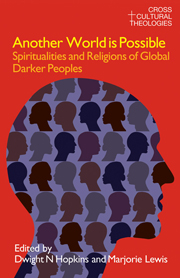Book contents
- Frontmatter
- Dedication
- Contents
- Acknowledgements
- Contributors
- Introduction
- Part I India
- Part II Japan
- Part III Australia
- Part IV Hawaii
- Part V England
- Part VI South Africa
- Part VII Botswana
- Part VIII Zimbabwe
- Part IX Ghana
- Part X Cuba
- Part XI Jamaica
- Part XII Brazil
- Part XIII USA
- 23 Womanist Theology and Epistemology in the Postmodern U.S. Context
- 24 A Home-place: Self-identity and God in African American Culture
- 25 Black Christian Worship: Theological and Biblical Foundations
- Endnotes
- Select Bibliography
- Index of Subjects
- Index of Names
23 - Womanist Theology and Epistemology in the Postmodern U.S. Context
from Part XIII - USA
- Frontmatter
- Dedication
- Contents
- Acknowledgements
- Contributors
- Introduction
- Part I India
- Part II Japan
- Part III Australia
- Part IV Hawaii
- Part V England
- Part VI South Africa
- Part VII Botswana
- Part VIII Zimbabwe
- Part IX Ghana
- Part X Cuba
- Part XI Jamaica
- Part XII Brazil
- Part XIII USA
- 23 Womanist Theology and Epistemology in the Postmodern U.S. Context
- 24 A Home-place: Self-identity and God in African American Culture
- 25 Black Christian Worship: Theological and Biblical Foundations
- Endnotes
- Select Bibliography
- Index of Subjects
- Index of Names
Summary
During the first half of the 1980s, two black women writers, one African and the other African American, used the terms “Womanist/Womanism” independently of each other to signal the unparalleled experience that black women have in the particular institutions, cultures, and societies of which they are a part. Both Alice Walker and Chikwenye Okonjo Ogunyemi, as novelists, suggested Womanism as a distinctive praxis for gathering and narrating spheres of knowledge about the lives of black women.
Divided into three parts, this article examines Walker's and Ogunyemi's approaches to Womanism, explores the Womanist experience in the postmodern U.S. context, and considers what feminist and Womanist theologians in the U.S. might gain for their constructive work in the postmodern context of the United States.
Walker and Ogunyemi: Approaches to Womanism
In 1983, Alice Walker's In Search of Our Mothers' Gardens set the pace for Womanism in the black North American context. This Womanist text is an inspiration to African American women who daily deal with and defiantly expend energy resisting multiple oppressive structures. Moreover, black women resonate with Walker's work because it speaks of our uncompromising commitment to the African American community, which is a source of both nurture and suffering.
- Type
- Chapter
- Information
- Another World is PossibleSpiritualities and Religions of Global Darker Peoples, pp. 307 - 312Publisher: Acumen PublishingPrint publication year: 2009



